Those of my Esteemed Readers who are of a certain age may remember the days of the reel-to-reel tape deck.
I’m not talking about the Philips compact tape cassette. Cassettes (now obsolete in our world of digital music) were wonderfully convenient, a popular medium for audio recordings back in the days when the only way to record your own mixes or make your own copies was to dub them onto tape. I still have a pile of cassettes that I recorded back in the mid 1970’s off my voluminous LP collection for use in my car stereo.
Cassettes were a hell of a lot easier to use than reel-to-reel tapes, which had to be threaded through the machine and onto a take-up reel...but for sheer sound quality in those analog days, it was hard to beat ¼" magnetic tape running at 7½ or 15 ips. You didn’t need Dolby noise reduction, which was invented to overcome the limitations of the compact cassette - the signal-to-noise ratio was high, and there was little flutter or wow.
The main problem with tape, as opposed to, say, an LP, was that tape is not a random-access medium. With an LP, you can pick the needle up and put it on any spot on the record, any time you want. With CD’s, random access is even easier - just push a button to jump from track to track or to fast-forward. But with tape, you have to wind the tape forward or rewind it to reach a specific spot. And as with audio, so too with video. (Anyone remember videotape? VHS? Bueller? Bueller?)
The written-word analogy to audio- or videotape is a parchment scroll, something with which we Jews are quite familiar. For while we may study Torah from printed, bound volumes, public readings must be conducted using a hand-inscribed scroll of kosher parchment. And while the regular weekly cycle of readings begins “In the beginning...” and works its way to the end of D’varim (Deuteronomy) over the course of the year, special readings for holidays, fast days, new moons, et cetera, tend to jump around. And since a scroll (unlike a printed book) is not a random access-friendly document, it means fast-forwarding or rewinding.
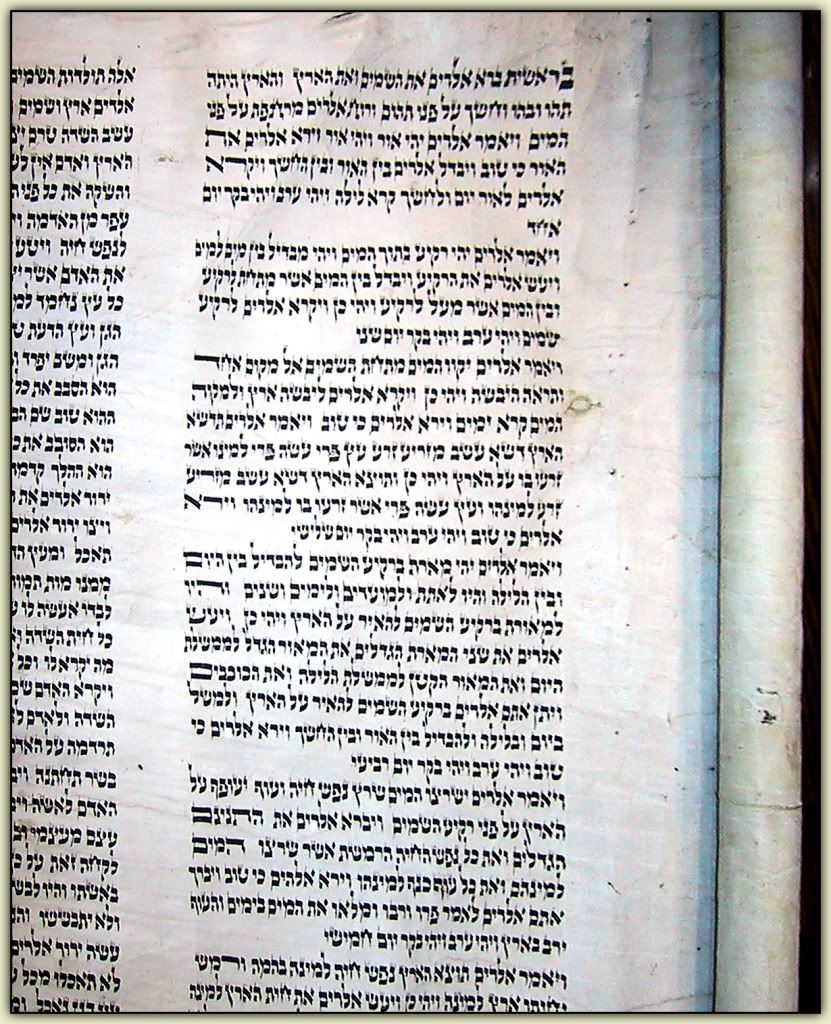
“In the beginning God created heaven and earth...”
The first panel of Genesis from a ~350-year-old Torah scroll. [Click to embiggen.]
Take Rosh Hashanah, for example. On each day, there is a series of readings from the book of Genesis, followed by a final reading (“Maftir”) from Numbers. After completing the first series, you’d have to roll the scroll from one end to about a quarter from the other end, a time-consuming operation. Rather than force the congregation to sit and twiddle their collective thumbs while the scroll is fast-forwarded, we employ a simple solution: two scrolls, each pre-rolled to the appropriate place.
The operative word here being pre-rolled. Somebody’s gotta do it in advance.
Thus, this morning, there was a whole lotta Holy Rolling goin’ on.
One of our scrolls had been positioned at the end of Exodus for yesterday’s special reading, it having been a minor fast day (AKA “half-fast”). But tomorrow, it needs to be almost at the end of Deuteronomy for the regular Shabbat reading.
Roll, roll, roll, roll, roll, roll, roll, roll, roll, roll, roll, roll.
Another scroll was near the beginning of Genesis for the second day of Rosh Hashanah, when we read about the binding of Isaac. It, too, needed to be rolled to the end of Deuteronomy.
Roll, roll, roll, roll, roll, roll, roll, roll, roll, roll, roll, roll.
It’s a two-man job, this Holy Rolling, and it moves quickly once you get the right rhythm going. Good exercise, too. And exercise always is more fun when you can hum a little tune:
Rolling, rolling, rolling,
Keep them Torahs rolling
Rolling, rolling, rolling,
Sheep-hide!
[A note to the observant: The image of the Torah scroll above has been carefully Photoshopped to avoid potential desecration of the Name. While some observant Jews and/or considerate Christians will substitute a hyphen for the “o” - thus, “G-d” - I don’t have a problem writing the word “God” in English. But in Hebrew, it’s another matter entirely. Now, however, you don’t have to worry about the consequences of printing the above photograph and treating same with less than the appropriate respect.]
I’m not talking about the Philips compact tape cassette. Cassettes (now obsolete in our world of digital music) were wonderfully convenient, a popular medium for audio recordings back in the days when the only way to record your own mixes or make your own copies was to dub them onto tape. I still have a pile of cassettes that I recorded back in the mid 1970’s off my voluminous LP collection for use in my car stereo.
Cassettes were a hell of a lot easier to use than reel-to-reel tapes, which had to be threaded through the machine and onto a take-up reel...but for sheer sound quality in those analog days, it was hard to beat ¼" magnetic tape running at 7½ or 15 ips. You didn’t need Dolby noise reduction, which was invented to overcome the limitations of the compact cassette - the signal-to-noise ratio was high, and there was little flutter or wow.
The main problem with tape, as opposed to, say, an LP, was that tape is not a random-access medium. With an LP, you can pick the needle up and put it on any spot on the record, any time you want. With CD’s, random access is even easier - just push a button to jump from track to track or to fast-forward. But with tape, you have to wind the tape forward or rewind it to reach a specific spot. And as with audio, so too with video. (Anyone remember videotape? VHS? Bueller? Bueller?)
The written-word analogy to audio- or videotape is a parchment scroll, something with which we Jews are quite familiar. For while we may study Torah from printed, bound volumes, public readings must be conducted using a hand-inscribed scroll of kosher parchment. And while the regular weekly cycle of readings begins “In the beginning...” and works its way to the end of D’varim (Deuteronomy) over the course of the year, special readings for holidays, fast days, new moons, et cetera, tend to jump around. And since a scroll (unlike a printed book) is not a random access-friendly document, it means fast-forwarding or rewinding.

“In the beginning God created heaven and earth...”
The first panel of Genesis from a ~350-year-old Torah scroll. [Click to embiggen.]
Take Rosh Hashanah, for example. On each day, there is a series of readings from the book of Genesis, followed by a final reading (“Maftir”) from Numbers. After completing the first series, you’d have to roll the scroll from one end to about a quarter from the other end, a time-consuming operation. Rather than force the congregation to sit and twiddle their collective thumbs while the scroll is fast-forwarded, we employ a simple solution: two scrolls, each pre-rolled to the appropriate place.
The operative word here being pre-rolled. Somebody’s gotta do it in advance.
Thus, this morning, there was a whole lotta Holy Rolling goin’ on.
One of our scrolls had been positioned at the end of Exodus for yesterday’s special reading, it having been a minor fast day (AKA “half-fast”). But tomorrow, it needs to be almost at the end of Deuteronomy for the regular Shabbat reading.
Roll, roll, roll, roll, roll, roll, roll, roll, roll, roll, roll, roll.
Another scroll was near the beginning of Genesis for the second day of Rosh Hashanah, when we read about the binding of Isaac. It, too, needed to be rolled to the end of Deuteronomy.
Roll, roll, roll, roll, roll, roll, roll, roll, roll, roll, roll, roll.
It’s a two-man job, this Holy Rolling, and it moves quickly once you get the right rhythm going. Good exercise, too. And exercise always is more fun when you can hum a little tune:
Rolling, rolling, rolling,
Keep them Torahs rolling
Rolling, rolling, rolling,
Sheep-hide!
[A note to the observant: The image of the Torah scroll above has been carefully Photoshopped to avoid potential desecration of the Name. While some observant Jews and/or considerate Christians will substitute a hyphen for the “o” - thus, “G-d” - I don’t have a problem writing the word “God” in English. But in Hebrew, it’s another matter entirely. Now, however, you don’t have to worry about the consequences of printing the above photograph and treating same with less than the appropriate respect.]



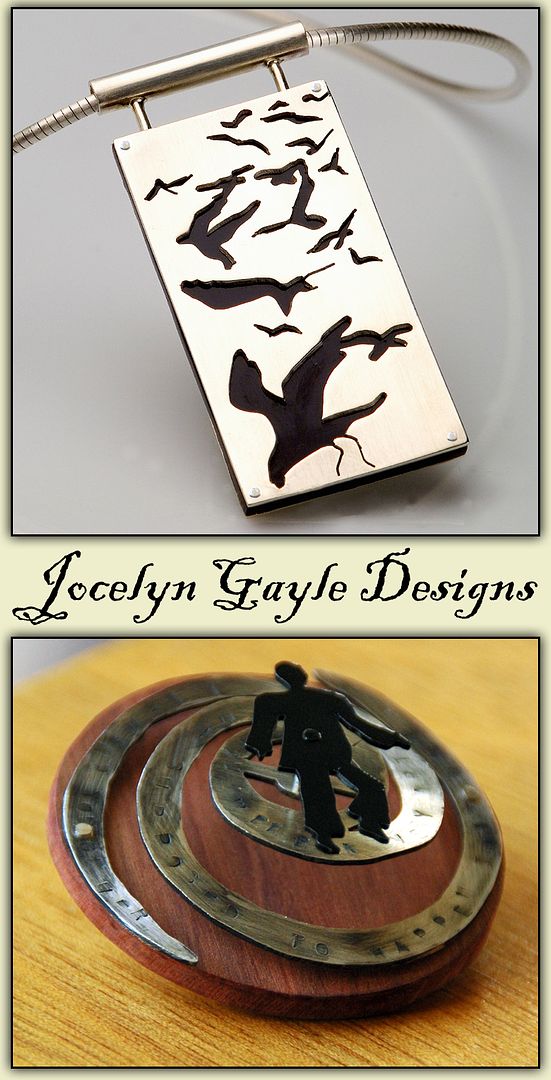
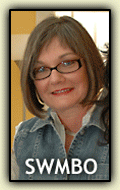


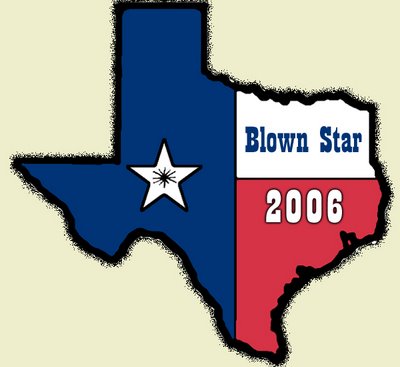





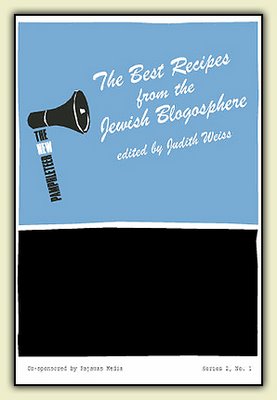






No comments:
Post a Comment